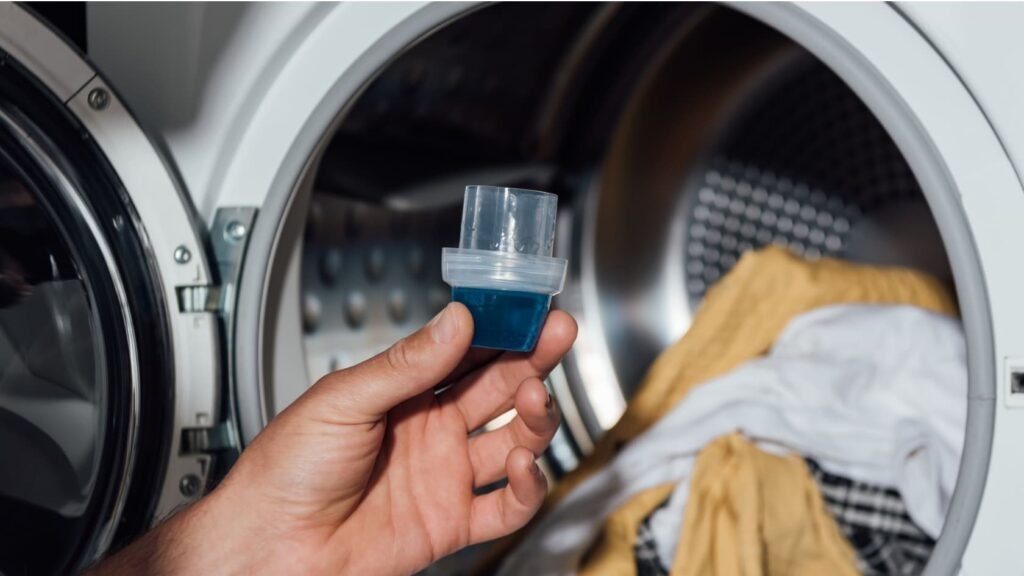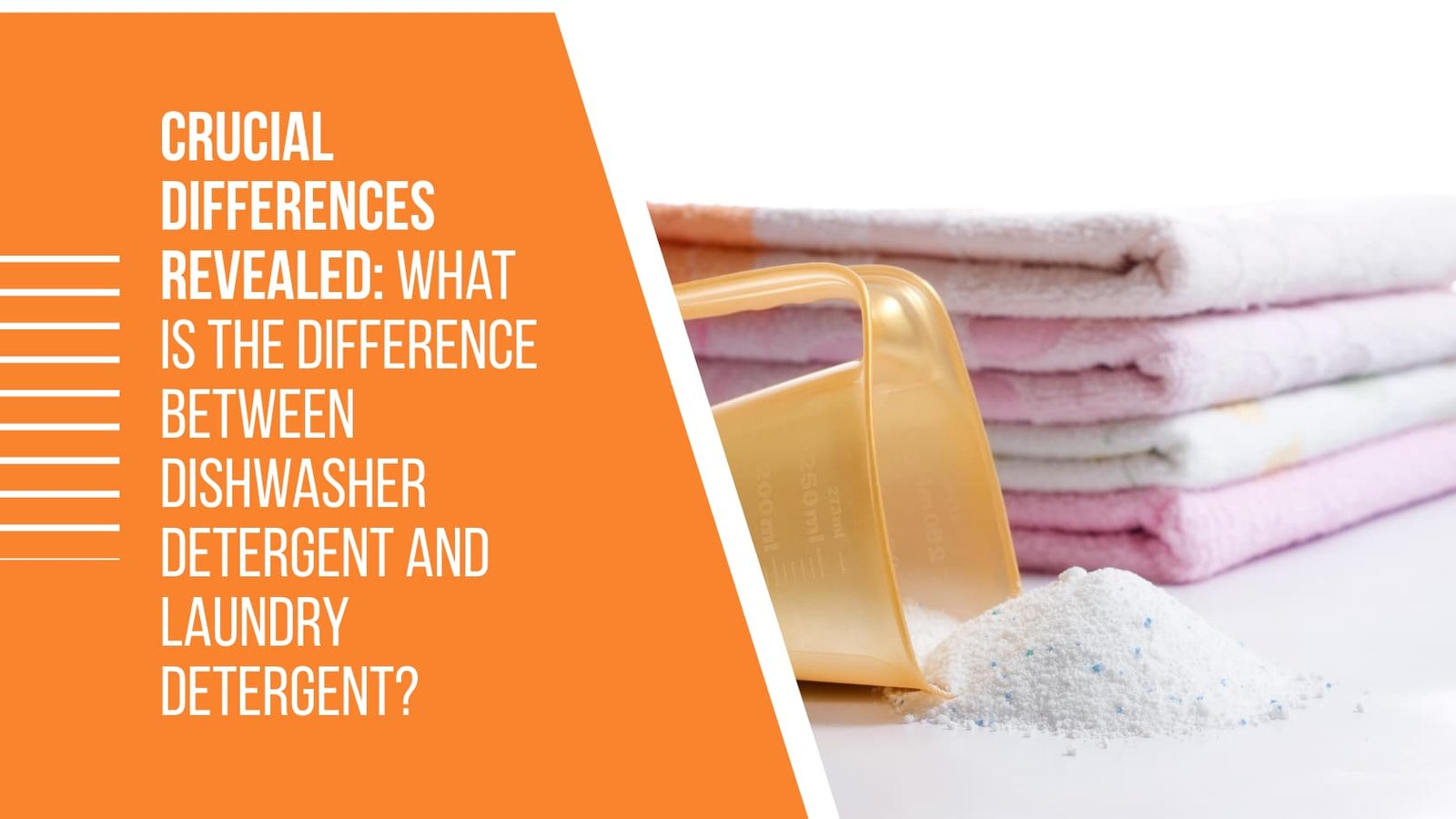Are you using the right detergent for your cleaning needs?
The difference between dishwasher detergent and laundry detergent is more than just their intended uses.
Understanding these crucial differences is essential for achieving optimal cleaning results and maintaining the quality of your clothes and dishware.
Dishwasher detergent and laundry detergent are formulated differently to cater to the specific cleaning requirements.
The composition of dishwasher detergents is designed to tackle tough grease and food residues, while laundry detergents focus on removing stains and dirt from fabrics.
This article shows you the crucial differences between dishwasher detergent and laundry detergent.
We’ll be exploring the potential risks of using the wrong detergent, and providing insights into the importance of using the correct detergent for different cleaning purposes.
Let’s uncover the key distinctions and understand the implications of choosing the right detergent for your cleaning needs.
Some links in this post are affiliate links, meaning, at no additional cost to you, we may earn a commission if you click through and make a purchase. As an Amazon Associate, I earn from qualifying purchases.
What Makes Dishwasher Detergent Different from Laundry Detergent?

Understanding the differences between dishwasher detergent and laundry detergent is vital.
Knowing this difference ensures the longevity and proper care of dishes, cookware, and clothing.
Because of their unique chemical compositions, these detergents cannot be interchanged, mainly because they accomplish different cleaning tasks.
Formulation Differences:
| Dishwasher Detergent | Laundry Detergent |
|---|---|
| High alkalinity for cutting through grease | Milder pH to be gentle on fabrics |
| Contains phosphates (region-specific) | Enzyme-based formulas for stain removal |
| Presence of chlorine bleach for sanitizing | Surfactants to clean at cool temperatures |
| Functions in hot water | Works in warm, hot, or cold water |
| No softening agents | May contain fabric softeners |
Dishwasher detergents often include a combination of alkaline chemicals and, in some areas, phosphates, to effectively break down food residues.
Laundry detergents, on the other hand, are formulated with enzymes and surfactants to remove stains without damaging fabrics.
Why Are Dishwasher Detergents Harsher?
Dishwasher detergents are characterized as harsher for several reasons
Alkaline Nature: The significant alkalinity is engineered to combat tough grease and food particles.
High Temperature Tolerance: They are formulated to perform under the high-temperature conditions of dishwashing cycles.
Sanitization: Chlorine bleach is commonly incorporated to not only remove tough stains such as those left by coffee and tea but also to disinfect cookware and utensils.
Environment: The turbulence and high volume of water in dishwashers necessitate a robust formula that can maintain its cleaning efficacy under such conditions.
Using these powerful detergents on delicate fabrics would likely result in damage and degradation.
So I recommend you strictly use each product for its intended purpose.
The Role of Enzymes and Surfactants in Laundry Detergents
Laundry detergents have a sophisticated blend of enzymes and surfactants
Enzymes: These are critical components targeting specific stain types. Proteases focus on proteins, amylases target starches, and lipases battle fats and oils. This specificity ensures that a range of stains are effectively removed during the washing process.
Surfactants: These agents work to lower the surface tension of water, ensuring better penetration into fabrics and lifting away dirt and oils. Their gentle nature allows for effective cleaning in varying water temperatures and helps protect the clothing from damage.
Can Dishwasher Detergent Be Used for Laundry?

The question of whether dishwasher detergent should be used to do laundry sometimes arises out of curiosity or due to unforeseen circumstances.
But using dishwasher detergent for laundry is not recommended due to its chemical makeup. This makeup is unsuitable and could potentially cause harm to clothing.
A dishwasher detergent contains a potent formula formulated to break down tough food particles and grease on dishes during high-temperature washing.
These same chemicals may lead to damaging effects on fabric when used for laundering purposes.
Potential Risks
The utilization of dishwasher detergent in place of laundry detergent carries several risks, including
Immediate damage to clothing, such as fading, discoloration, or fabric disintegration, particularly visible on colored or delicate items.
Chemical residues left in clothing post-wash that can cause skin irritation or allergies, especially for those with sensitive skin.
Chemical Damage to Clothing
Although dishwasher detergents are great for sanitizing kitchenware and removing food remnants, they aren’t suitable for apparel and can damage fabric.
The powerful ingredients in these detergents can
Break down fabric fibers, leading to weakened materials.
Fade the colors of clothes.
Cause irreversible harm to delicate garments.
Long-Term Effects on Fabric Quality
Repeated use of dishwasher detergent on clothing can culminate in
A decline in fabric elasticity.
Increased likelihood of pilling.
Overall deterioration of the clothing’s texture and durability.
This repeated exposure can significantly shorten a garment’s wearable life.
Some Recommendations
To avoid the risks associated with using dishwasher detergent for laundry, consider these guidelines
Always opt for the appropriate detergent for the cleaning task.
If laundry detergent is not at hand, gently hand wash with a mild, benign soap.
Explore other laundry-appropriate substitutes if necessary.
To maintain your clothing quality and extend its lifespan, you need to stick with these recommendations.
Why Is It Important to Use the Correct Detergent?
It’s imperative to use the proper detergent for cleaning tasks to ensure safety and optimal cleaning performance.
Table: Detergent Safety and Efficiency
| Detergent Type | Purpose | Safety Concerns |
|---|---|---|
| Dishwasher Detergent | Dishes, Glassware | Harsh chemicals can harm skin or be toxic |
| Laundry Detergent | Clothing, Linens | Excessive suds may cause appliance damage |
Using the correct detergent prevents chemical harm to fabric, health risks from prolonged skin contact, and the potential ingestion of dangerous chemicals.
What Are the Consequences of Using the Wrong Detergent?
Here’s what can go wrong if you use the wrong detergent
Immediate Damage to Appliances and Clothing: When laundry detergent is used in dishwashers, it can create a surplus of suds, which might overflow. This overflow can cause leaks and potential water damage in your kitchen. Also, dishwasher detergent in a washing machine can aggressively attack fabrics, leading to discoloration and weakening of your clothes.
Long-Term Appliance Damage: Continuous misuse can lead to inappropriate residues that build up in your machines. The corrosive nature of dishwasher detergent can damage washing machine parts. In the case of using a laundry detergent in a dishwasher, it can block and harm dishwasher pumps and drainage systems.
Additional Costs: Misuse cannot only shorten the lifespan of your appliances, but can also increase expenses through frequent repair needs and early replacements.
Are There Any Safe Alternatives Uses?
Certainly, when it comes to multipurpose cleaning, there’s room for flexibility with detergents.
Dishwasher detergent isn’t just for dishes; it can surprise you with its versatility.
Its formidable grease-cutting ability makes it a go-to for challenging tasks like sprucing up oven doors and cutting through the grime on stovetops.
It even shines in the bathroom, tackling hard water stains with ease.
However, caution is necessary. To ensure that surfaces aren’t left with a soapy film, proper dilution is key. Mix dishwasher detergent with warm water and apply cautiously. Always follow with a thorough rinsing to clear away any lingering soap residue.
Alternate Uses of Dishwasher Detergent
Oven Doors: Cuts through baked-on grease.
Stovetops: Removes accumulated cooking residues.
Bathroom Fixtures: Banishes hard water stains.
Conclusion
The right detergent plays a pivotal role in maintaining the efficacy and condition of our laundry and dishwashing appliances.
Dishwasher and laundry detergents are specially crafted with unique compositions to target the cleaning needs specific to kitchenware and clothing.
Ignoring these differences can result in subpar cleaning, potential appliance damage, and the detrimental long-term effects of using incorrect substances.
For a gentler touch or an eco-conscious clean, you can explore natural and homemade detergents.
These alternatives can be both kinder to the environment and to those with sensitivities, all while keeping your domestic tools in top shape.

Pazi Mboh, our Home Efficiency Advocate, is dedicated to promoting sustainable dishwasher use. His tips on energy and water efficiency not only help the environment but also save on your bills, making his guidance invaluable for eco-conscious households.





